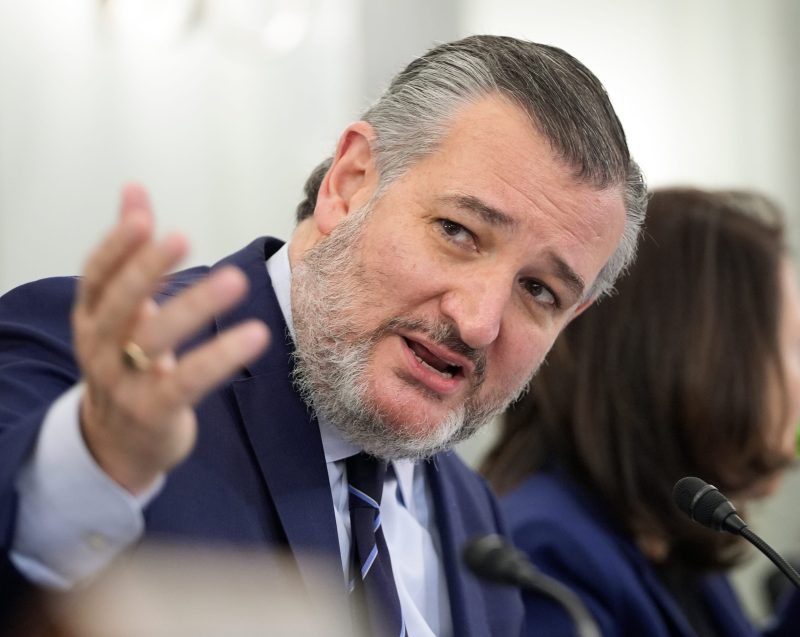WASHINGTON – To watch live sports at home in 2025, between all of the apps and channels and streams games air on thanks to billion-dollar rights deals, it can feel like being in a NASA control room.
Now Congress wants to be involved.
On Capitol Hill Tuesday, the Senate Commerce Committee – which has jurisdiction over the telecommunications professional sports leagues use to broadcast games – interviewed representatives from the NBA, MLB and the NHL about sports’ embrace of streaming, which creates a segmented market that is pricier for consumers.
“This is a growing problem,” Committee Chairman Sen. Ted Cruz, R-Texas, said after the hearing. “Fans are understandably upset that it’s really hard to watch your home team, figure out what app or what network, how to watch it. It’s fractured right now. It’s expensive right now.”
Notably, the NFL did not attend the hearing despite Cruz’s April 17 letter to commissioner Roger Goodell requesting his or a league representative’s presence. The NFL did not respond to a prior request from USA TODAY Sports for comment asking if the league intended to send a representative.
“I wish they had come,” Cruz said. “I think the issues that were discussed apply to them just like they apply to the leagues that were here.”
The main lines of questioning during the lightly-attended meeting – nine of the 25 committee members showed up and most stayed for only brief periods – revolved around whether the leagues are not taking advantage of the anti-trust legislation afforded to them through the Sports Broadcasting Act of 1961. The leagues said that because they can operate as one entity during media-rights negotiations, they can pool resources to create a cheaper and more accessible model for fans.
John Bergmayer, the fourth witness and the legal director of the non-profit group Public Knowledge, said fans feel like they finally broke free of the cable bundle only to watch it reform thanks to streaming platforms.
“Streaming is no longer an afterthought, and policymakers, content creators, tech platforms, and sports leagues need to take steps to ensure that shifts in the media, technology, and sports landscapes benefit viewers, and lead to cheaper and more convenient options,” Bergmayer said during his opening statement.
The subject of local blackouts came up early, with MLB executive vice president of media and business development Kenny Gersh saying each club has the right to distribute on cable in its market and that 29 of the 30 clubs also have a direct-to-consumer (DTC) option for streamers. But the collapse of the Regional Sports Network (RSN) market has also created an upheaval for leagues.
“As we continue to have flux in the system, we’re going to have to continue to evaluate,” NHL senior executive vice president of media and international strategy David Proper said.
Many of the Democratic senators, including ranking member Sen. Maria Cantwell, D-Washington, Sen. Ben Ray Lujan, D-New Mexico and Sen. Ed Markey, D-Massachusetts, used their time to lambast President Donald Trump’s proposed cuts of National Public Radio and PBS.
Sen. Amy Klobuchar, D-Minnesota, explicitly asked NBA president of global content and media distribution Bill Koenig about the league’s valuation of the WNBA in its media rights negotiations.
“We’re mindful of the growing popularity of the WNBA,” said Koenig, who added that the new media rights deals – valued at $76 billion – included upside provisions. For example, the revenue sharing that comes from advertising numbers stands to benefit the WNBA, he said.
Sen. Marsha Blackburn, R-Tennessee, used her five minutes to grill Koenig about the Daryl Morey “Hong Kong” freedom tweet from nearly six years ago and wanted to know what broadcast rights in China are worth. She also inquired about internet piracy and its impact on streaming.
Sen. Bernie Moreno, R-Ohio, encouraged the leagues to find solutions on their own rather than compelling Congress to be involved and regulate the leagues further, while Sen. Eric Schmitt, R-Missouri, relied on his experience of trying to stream St. Louis Cardinals games as an example of the plight fans go through to watch their teams.
“People do care about this a lot,” Schmitt said.
Cantwell was interested in whether the leagues have specific data or metrics about fan complaints.
“It’s certainly something we hear,” Gersch said.
Cantwell Cantwell floated a mandate for teams to make their games free in local markets backed by advertising revenue, a more traditional model. She doesn’t want the simple act of watching a sporting event to be hijacked by a larger consumer experience like having to buy an annual subscription to a streaming service such as Prime Video or Peacock.
“There’s just too much here where they can just think about the dollar instead of thinking about the true consumer experience,” she said.
“In return for the very public benefits that teams and leagues receive,” Bergmayer said, demonstrating the difference from other entertainment products, “there should be an obligation to make sure that games are widely accessible.”
Cruz said the hearing was meant to be an informational, fact-finding exercise and he was pleased to that end.
A specific remedy, despite multiple legislative avenues, Cruz said, remains up in the air.
“It shouldn’t be insanely complicated or insanely expensive to cheer on your hometown team,” he said.

